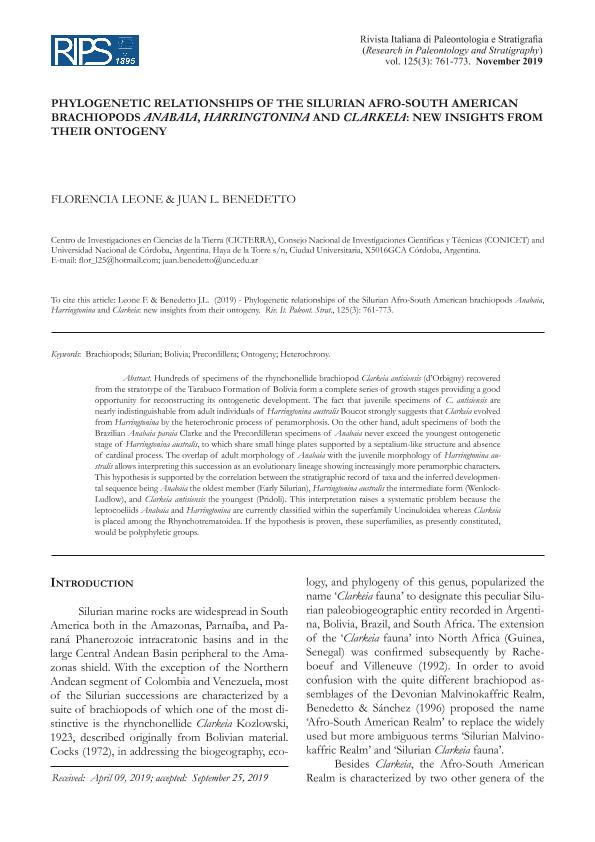Mostrar el registro sencillo del ítem
dc.contributor.author
Leone, Maria Florencia

dc.contributor.author
Benedetto, Juan Luis Arnaldo

dc.date.available
2020-12-17T13:39:38Z
dc.date.issued
2019-08
dc.identifier.citation
Leone, Maria Florencia; Benedetto, Juan Luis Arnaldo; Phylogenetic relationships of the Silurian Afro-South American brachiopods Anabaia, Harringtonina and Clarkeia: New insights from their ontogeny; Università degli Studi di Milano; Rivista Italiana di Paleontologia e Stratigrafia; 125; 3; 8-2019; 761-773
dc.identifier.issn
0035-6883
dc.identifier.uri
http://hdl.handle.net/11336/120726
dc.description.abstract
Hundreds of specimens of the rhynchonellide brachiopod Clarkeia antisiensis (d’Orbigny) recovered from the stratotype of the Tarabuco Formation of Bolivia form a complete series of growth stages providing a good opportunity for reconstructing its ontogenetic development. The fact that juvenile specimens of C. antisiensis are nearly indistinguishable from adult individuals of Harringtonina australis Boucot strongly suggests that Clarkeia evolved from Harringtonina by the heterochronic process of peramorphosis. On the other hand, adult specimens of both the Brazilian Anabaia paraia Clarke and the Precordilleran specimens of Anabaia never exceed the youngest ontogenetic stage of Harringtonina australis, to which share small hinge plates supported by a septalium-like structure and absence of cardinal process. The overlap of adult morphology of Anabaia with the juvenile morphology of Harringtonina australis allows interpreting this succession as an evolutionary lineage showing increasingly more peramorphic characters. This hypothesis is supported by the correlation between the stratigraphic record of taxa and the inferred developmental sequence being Anabaia the oldest member (Early Silurian), Harringtonina australis the intermediate form (Wenlock-Ludlow), and Clarkeia antisiensis the youngest (Pridoli). This interpretation raises a systematic problem because the leptocoeliids Anabaia and Harringtonina are currently classified within the superfamily Uncinuloidea whereas Clarkeia is placed among the Rhynchotrematoidea. If the hypothesis is proven, these superfamilies, as presently constituted, would be polyphyletic groups.
dc.format
application/pdf
dc.language.iso
eng
dc.publisher
Università degli Studi di Milano

dc.rights
info:eu-repo/semantics/openAccess
dc.rights.uri
https://creativecommons.org/licenses/by-nc-sa/2.5/ar/
dc.subject
BOLIVIA
dc.subject
BRACHIOPODS
dc.subject
HETEROCHRONY
dc.subject
ONTOGENY
dc.subject
PRECORDILLERA
dc.subject
SILURIAN
dc.subject.classification
Paleontología

dc.subject.classification
Ciencias de la Tierra y relacionadas con el Medio Ambiente

dc.subject.classification
CIENCIAS NATURALES Y EXACTAS

dc.title
Phylogenetic relationships of the Silurian Afro-South American brachiopods Anabaia, Harringtonina and Clarkeia: New insights from their ontogeny
dc.type
info:eu-repo/semantics/article
dc.type
info:ar-repo/semantics/artículo
dc.type
info:eu-repo/semantics/publishedVersion
dc.date.updated
2020-11-25T16:09:10Z
dc.identifier.eissn
2039-4942
dc.journal.volume
125
dc.journal.number
3
dc.journal.pagination
761-773
dc.journal.pais
Italia

dc.journal.ciudad
Milán
dc.description.fil
Fil: Leone, Maria Florencia. Consejo Nacional de Investigaciones Científicas y Técnicas. Centro Científico Tecnológico Conicet - Córdoba. Centro de Investigaciones en Ciencias de la Tierra. Universidad Nacional de Córdoba. Facultad de Ciencias Exactas Físicas y Naturales. Centro de Investigaciones en Ciencias de la Tierra; Argentina
dc.description.fil
Fil: Benedetto, Juan Luis Arnaldo. Consejo Nacional de Investigaciones Científicas y Técnicas. Centro Científico Tecnológico Conicet - Córdoba. Centro de Investigaciones en Ciencias de la Tierra. Universidad Nacional de Córdoba. Facultad de Ciencias Exactas Físicas y Naturales. Centro de Investigaciones en Ciencias de la Tierra; Argentina
dc.journal.title
Rivista Italiana di Paleontologia e Stratigrafia

dc.relation.alternativeid
info:eu-repo/semantics/altIdentifier/doi/http://dx.doi.org/10.13130/2039-4942/12224
dc.relation.alternativeid
info:eu-repo/semantics/altIdentifier/url/https://riviste.unimi.it/index.php/RIPS/article/view/12224
Archivos asociados
